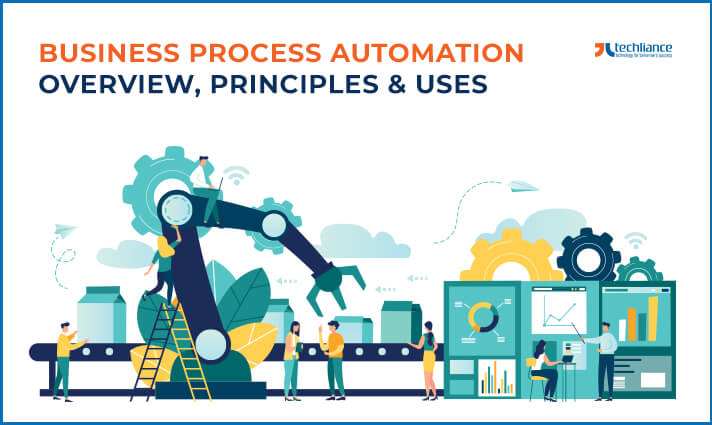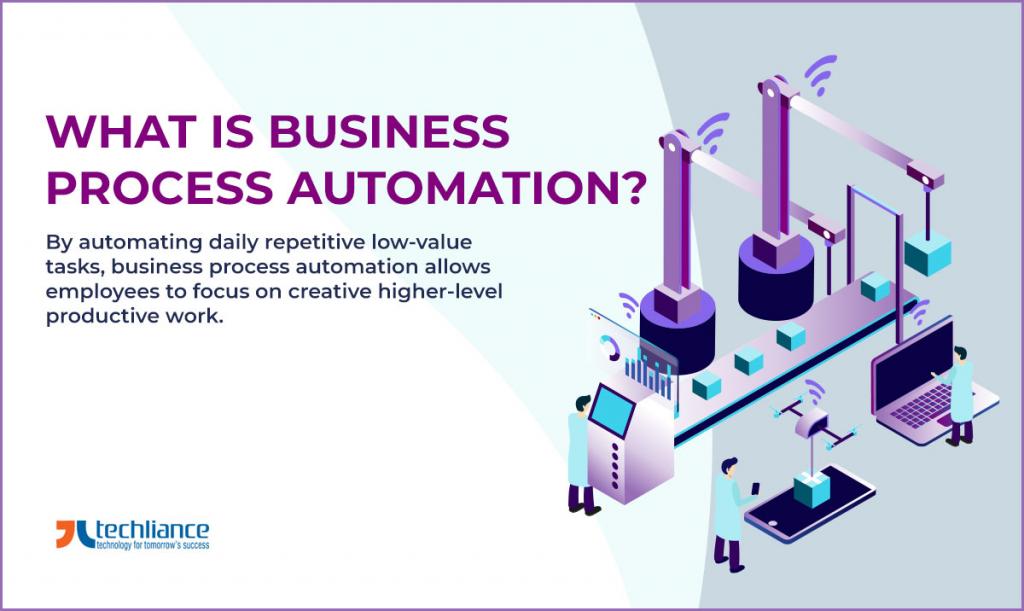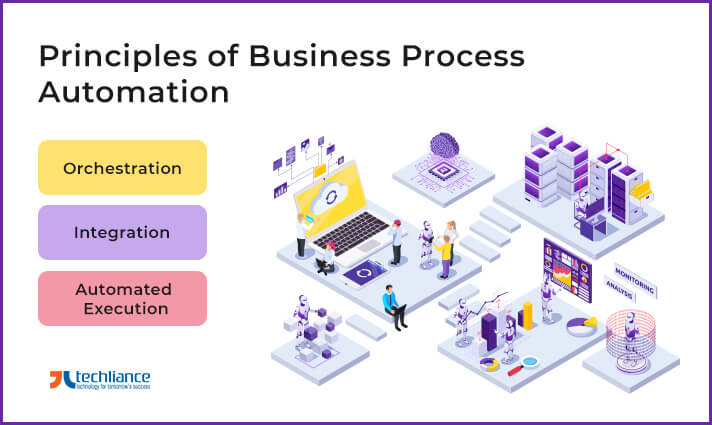The IT industry is always looking for ways to optimize processes. With processes working efficiently in the system, the output of the product is higher with various processes interconnected in form of a workflow that runs smoothly with fewer errors and higher capacity. As a result, the concept of business process automation has become increasingly popular in 2024.
Through the means of digital transformation or process automation, companies are able to achieve a higher output, minimization of costs, and overall efficiency in the system. The objective is to automate routine business tasks through initiation, execution, and completion while achieving enterprise-wide workflow efficiency.
An experienced information technology services company can help startups and enterprises in automating their business processes. This way they can run their business smartly and focus on scaling more growth.

What Is Business Process Automation?
By automating daily repetitive low-value tasks, business process automation (BPA) allows employees to focus on creative higher-level productive work.
It is all about automating various business processes, streamlining them, and driving your organization towards achieving established goals.
So, BPA helps you save time, cut costs, and eliminate human errors.

Principles of Business Process Automation
In order to introduce automation of business processes, the following principles need to be applied to the system.
Orchestration
Within the enterprise, Orchestration implies centralized management of the whole system.
Integration
The business processes need to be connected with each other through Integration, where the output of one process becomes the input of another.
Automated execution
The primary objectives of Automated Execution are to reduce the budget, operating time, and human intervention to a minimum level.

Uses of Business Process Automation
The concept of BPA goes hand in hand with current web-based solutions available in the market. Our article will now closely look at some of the examples of automating the business processes, to explain how this concept is being currently applied in the industry across the globe.
Accounts Payable
The concept of distributing payments, employee salaries, and managing accounts is always a cumbersome task. The legacy systems lack the intuition of providing sufficient means which consequently leads to errors.
Accounts payable is a recurring process that occurs in the system on a monthly, quarterly, or even annual basis. Because let’s face it, anyone who is rendering their service needs to be paid or compensated as stated in the contract.
With manual systems, the management of numbers through registers, copies, and other such means is hard work with a lot of follow-ups, and maintenance of a huge volume of paper with a high risk of misplacing information.
The digital transformation of the entire accounts payable process is a sigh of relief where the entire process is automated. In case it requires some form of human intervention for approval of dispatching of funds, an email notification can be sent out for the person to be alerted about providing approval.
Similarly, the costs of hiring special resources are variably cut down where you have minimal staff with expertise in running the process and ensuring that the work carries out without any interruption.
The timely dispatch of the compensation for the staff, vendors, and other stakeholders ensures that the relationship with everyone remains docile without any harsh feelings of resentment that usually surface with delays in payments.
Contract Management
Process automation of contracts can be the best way, especially with a high volume of contracts and stakeholders involved. Imagine a large group of people working together with the history of contracts that need to be carried forward in building future contracts and clauses. How can you track information about a contract that occurred for example 20 years ago?
If the system is manual, you will probably have to go through a large volume of paperwork to find the contract and see its clauses. However, if contract management is automated then you just have to browse through the relevant records to find the information you require within a matter of minutes. The centralization of information provides an efficient way of tracking valuable information that serves as the basis for the further buildup of information.
Employee Management System
Any company with even a handful of employees understands the hassle of managing employee attendance, leaves, and requests. These aspects are important for the company’s management to track. So, they can know the overall punctuality and attendance of employees which is also a good starting point at the time of appraisals.
With the digital transformation of the employee management system, their attendance and leave approvals can be directly managed through automation. The employees can simply put up their leave request on the portal and the relevant manager is notified about the leave which they can approve or reject as per their discretion.
Other examples of BPA systems include the following operations.
- E-mail and push notifications
- Help-desk support
- Creating customer case studies
- Data aggregation and migration
- Backup and restoration
- Employee leave requests
- Procurement
- Call center processes
- Sales orders
- Time and attendance tracking
- Payroll
- Invoicing
- Collections
- Product launches
- Lead nurturing
When is the digital transformation most required?
Automating business processes is a requirement in modern-day situations. However, it is important to understand the areas where automation can be helpful. Before implementing this concept, it is necessary to evaluate whether automation will be a viable option or not.
These points can help you understand if the current situation of your business requires automation. Business Process Automation is a good option for you if:
- The volume of tasks is high
- The inter-dependency of approvals, information updates, and flow are shared between various people to complete the tasks
- The tasks are of time critical nature where completion is required for dispersing information and other attributes
- The process impacts other processes and systems
- There is a need for compliance and audit trials in the system which cannot be accommodated through manual intervention because of the huge volume of data and tasks
- Should your activity fall in these points, then it is preferable to go for automating your business process.

Conclusion
With the passage of time, the concept of big data is becoming increasingly meaningful. A lot of legacy software is now being replaced with new automated business systems that help in interpreting data and adding more meaning to the routine operations of organizations.
Similarly, business process automation leads to higher transparency of existing operations. It adds higher security by providing control and authentication to the processes.
There is also the factor of reduced errors and faster output which overall reduces additional costs for the organizations. Ultimately, the organization is able to build a reliable reputation in the market by holding its own. All the related stakeholders get accurate and timely responses.
On day-end, it’s all about taking care and building stronger alliances with stakeholders so that you are able to sustain and grow your business. A sound automated business process can help you in this cause.
If you are a company looking for ways to enhance your daily routine operations and don’t know how to start then discuss with Techliance today. Our consultants will have a free discussion with you to talk about your business process automation needs and guide you on ways to present you with the best solutions as per business requirements.

FAQs about Business Process Automation
The following are the frequently asked questions (FAQs) related to Business Process Automation or Digital Transformation.
Business Process Automation (BPA) is streamlining of sophisticated business functions. It is also known as business automation or digital transformation. The primary objective of automating business processes is to bring simplicity to the existing operations workflow to increase quality and minimize costs.
Business Process Automation provides accountability, transparency, and accuracy in data recording. Through workflow, you can retain all process-related communication to make execution easier and faster.
There are many ways of automating a business process including the use of specific technologies, integration of data and systems, control of workflow, task distribution, and real-time monitoring.





